Gyula Molnár and the Beginnings of the Lutheran Congregation in Esztergom
Abstract
Gyula Molnar was the first pastor and church builder of the Lutheran congregation in Esztergom. This paper presents the development of the congregation through the first 27 years of Molnár’s life, set against the backdrop of the social and political history of the era from the dawn of the 20th century until 1941, when the church was built. The author uses documents and archives from the era as well as scholarly literature to present a time of change and strife, and to highlight the crucial contribution of brave women to the development of the congregation and the church—or, in broader context, the economy, culture, and society of their time. The author aims to show how worthy and fruitful it is to follow Christ, even when it might seem otherwise.
References
Amikor havi 200 fixszel az ember könnyen viccelt: jövedelmek a két világháború között. Múlt-kor.hu, 2021. július 6. https://mult-kor.hu/a-cote-dazurtol-a-havi-egyszeri-tejfogyasztasig-magyar-jovedelmek-a-20-szazad-elso-feleben-20210707. (Megtekintés: 2024. június 10.)
BIRTALAN Balázs 1997. Sorskönyv nélkül. Aduprint Kft., Budapest.
DOBOS László Gábor 1987. Belmissziói és szociális irányzatok a protestáns egyházakban és vallásos szervezetekben. In: Lendvai László Ferenc (szerk.): A magyar protestantizmus 1918–1948. Kossuth Kiadó, Budapest. 263–313. o.
Esztergom, X. évf. 30. sz. 1905. július 23. Web: https://library.hungaricana.hu/en/view/Esztergom_1905/?pg=249&layout=s. (Megtekintés: 2024. június 10.)
FABINY Tibor 1987. Az evangélikus egyház. In: Lendvai László Ferenc (szerk.): A magyar protestantizmus 1918–1948. Kossuth Kiadó, Budapest. 128–170. o.
KISS Antal 1941. Az 1934–37. évi budapesti országos evangélikus zsinat előzményei, lefolyása és joganyaga. Ludvig István Könyvnyomdája, Miskolc.
KLIMENTNÉ FERENCZY Andrea 2011. Gyülekezetünk története. Esztergom.lutheran.hu, https://esztergom.lutheran.hu/bemutatkozas.
KOLLEGA TARSOLY István (szerk.) 2000. Magyarország a XX. században. Babits Kiadó, Budapest. Web: https://mek.oszk.hu/02100/02185/html/251.html.
MOLNÁR Gyula 2005. A reformáció nyomai Esztergomban és környékén. Az esztergomi-dorogi evangélikus gyülekezet élete 1921–1984. Esztergomi Evangélikus Egyházközség, Esztergom.
NIEMÖLLER, Martin 2017. Niemöller tanúsága. Christophoros, XXIV. évf. 5. sz. 10. o.
Prohászka Ottokár szociális tanítása. Vigilia, 13. évf. 1948/5. sz. 257–277. o. Web: https://vigilia.hu/pdfs/Vigilia_1948_05_facsimile.pdf. (Letöltés: 2024. június 10.)
SIMÁNDI Irén 2009. Küzdelem a nők parlamenti választójogáért Magyarországon 1848–1938. Gondolat Kiadó, Budapest.
STIFNER-KŐHÁTI Dorottya 2020. Ahol Luther-rózsa vet fényt az oltárra. Evangélikus gyülekezet az egykori koronázóvárosban. Evangélikus Élet, 85. évf. 47–48. sz. 27–29. o.
SZINNYEI József 1894. Magyar írók élete és munkái. MTA, Budapest. https://mek.oszk.hu/03600/03630/html/. (Megtekintés: 2024. június 10.)
VARGA Gyöngyi 2021. Nomád teológia. Luther Kiadó, Budapest

This work is licensed under a Creative Commons Attribution-NonCommercial-NoDerivatives 4.0 International License.




